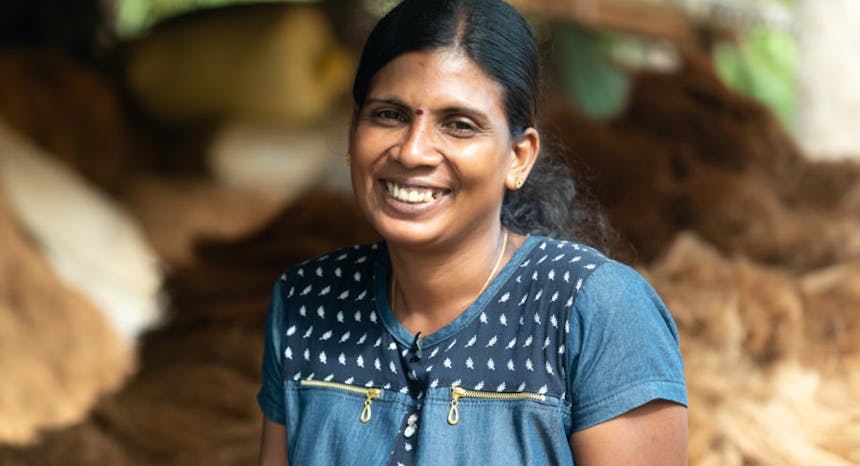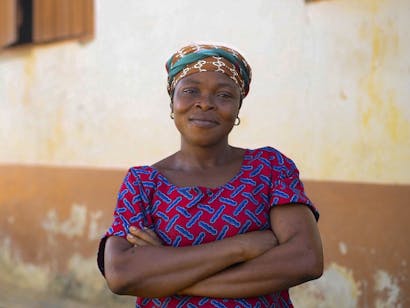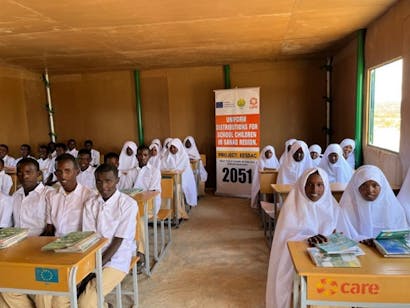Sharmini the factory owner from Sri Lanka
“My dream is to develop a large-scale company, directly exporting abroad”.
Sharmini Thiyakaran (33), is from Konavil in the North of Sri Lanka. She runs a successful manufacturing business, processing the husks of coconuts for fertiliser, mattress fibres and brushes. Her products are now exported across multiple continents.

After our drive through a maze of paddy fields and dirt roads, Sharmini warmly welcomes us with a broad smile outside her factory. She guides us along an avenue of coconut trees towards the heart of the business. We find a hive of activity, with women dressed in safety gear and uniforms all absorbed in their work, operating large machinery to process the coconut husks.
The impact of war
Born during the long civil war in Sri Lanka, Sharmini was one of six children born to parents who cultivated the paddy fields. Floods and droughts made this an unpredictable income for the family, Sharmini explains: “Sometimes we didn’t have enough food or clothes.” From a young age, Sharmini was helping in the fields and cooking at home, helping her mother who had multiple health problems. She recalls: “One day my teacher got so cross with me because my homework had coconut oil all over it. So my mother came in and explained about all the extra work I was doing at home. She didn’t scold me after that.”
The war had a significant impact on the family and they were displaced on several occasions and family members were forcefully recruited to fight. Sharmini’s parents wanted to give their intelligent daughter the opportunity of a full education, so her mother pawned her jewellery so she could go to university to study philosophy. Sharmini explains: “This was the first time I saw so much money in my life. When I was at university my family were displaced again and I didn’t even know where they were. I had no money for food or to pay my rent.” Despite these hardships, Sharmini never gave up on her studies and successfully graduated with a first class bachelors degree.
First steps in building a business
Soon after graduating Sharmini married Thiyakaran and they now have a five-year-old son, Reshikan. She adds: “When I was struggling to find a job, my husband decided he wanted to utilize his land full of coconut trees. It was then that the idea for the business started to take shape. I had the opportunity to receive training in coir brush production, part subsidized by the Government, and after that I could start the business using coconut husks to make brushes. With the help of the Coconut Development Board, I purchased the initial machines.”
The process of getting the business off the ground back in 2015 was slow and there were many who questioned her potential. Thankfully, Sharmini’s brother and her husband’s parents invested money to help kick-start the business. Sharmini explains: “At the start, my family feared that the investment would go to waste but now that they see our potential, they also want to continue investing in the business.” Sharmini also received a grant from CARE’s affiliate, Chrysalis in 2018, which she used to buy additional machinery and equipment.

Finding capital to expand
Since then, Sharmini has successfully taken out and repaid bank loans to invest in the business. However, accessing finance has not always been easy. Sharmini explains: “We are now focusing on further expansion of the business, but finding capital is the main barrier. Some banks ask for two government guarantors to approve a loan, it is very difficult to find officers to witness for us.” She continues: “Financial institutions are reluctant to provide women with loans as they don’t believe we can make enough income and repay the loan. Often, they ask us for land as collateral, but this is usually in the man’s name. I think the banks should develop special low-interest loans for women entrepreneurs, which are quicker to process.”
Chrysalis has connected Sharmini to new markets by introducing her to buyers and identifying sales opportunities through events. She also received business training, adding: “The Chrysalis training was a very important point in my life. I learnt about employing people and how to find buyers. I also learnt about having high quality products and how to understand profit and loss.”
Now the business is growing and Sharmini employs 16 people, mostly women, from the local community. She adds: “I am proud of this enterprise because it operates within our village and provides regular employment for women. This means they have a regular income and can feed their families.”
Sharmini’s husband became a role model
Sharmini is fortunate to have such a supportive husband. When there are large orders, they both work into the night together to complete on time. Sharmini adds: “I have a strong relationship with my husband and he supports me with the business decisions I make. He also helps me with the household chores.” As well as running the business, Sharmini also works as a Government teacher, in part to appease her parents who paid for her university education and want her to have a proper pension. She adds: “When I am teaching, my husband manages the enterprise smoothly – between us we define our roles and responsibilities. He manages production, orders, marketing, machinery repairs and the collection of coconut husks. He can also speak Sinhala so works with the buyers. I manage the staff, accounting, machine operations and arrange the final products for transportation.”

Sharmini’s husband has become something of a role model in the local community, she explains: “My employees are often surprised to hear that he has cooked dinner for us. I have seen some of their husbands changing their attitude towards the women, they have cut down their drinking and violence towards their families.” Having studied feminism, Sharmini adds with a wry smile that she often enlightens her husband on the finer points of feminism.
Both Sharmini and Thiyakaran want to set a strong example to their son about the division of labour. Thiyakaran is shy to speak, but when he does he says: “I want to teach our son that there’s nothing that can only be done by a man or only by a woman. In the factory we hired two men, but they couldn’t do it. The women were more efficient. I think by prioritising women and giving them higher positions in society, men will respect them and treat them equally.”
More ambitions for the future
Sharmini’s work ethic is something to behold, she is constantly on the go and is meticulous in her work. Holding down a teaching job, running a factory and managing a household might challenge even the toughest of characters, but not Sharmini. Despite averaging four hours of sleep each night she never looks exhausted or complains about her workload. It is clear that she is also a very handson and supportive boss and joins the line of women as they turn the drying coconut fibres in the yard.
The impact of her business on her family has also been profound, she adds: “Having a sustainable income is such a relief. Now we don’t have to worry about all the other problems that were weighing on our minds like abandoning our families to look for work elsewhere.”
She concludes: “My dream is to develop my industry as a large-scale company, directly exporting abroad. I also want to provide employment and training opportunities for at least 50 poor women, including those with disabilities.” As for herself personally, Sharmini wants to complete her Masters in Education, buy a car, speak English fluently and build a new house.
Based on Sharmini’s determination and work ethic, this long list of ambitions seems highly achievable.


